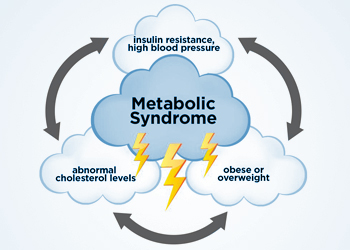 Metabolic disorders
Metabolic syndrome is a group of conditions–insulin resistance, high blood pressure, abnormal cholesterol levels and excess body fat around the waist–that dramatically increases risk of heart disease, stroke and prediabetes
Metabolic disorders
Metabolic syndrome is a group of conditions–insulin resistance, high blood pressure, abnormal cholesterol levels and excess body fat around the waist–that dramatically increases risk of heart disease, stroke and prediabetes Metabolism is the set of life–sustaining chemical transformations within the cells of living organisms.
These enzyme–catalyzed reactions allow organisms to grow and reproduce, maintain their structures and respond to their environments. The word metabolism can also refer to all chemical reactions that occur in living organisms, including digestion and the transport of substances into and between different cells.
Special enzymes break down food or certain chemicals so your body can use them right away for fuel or store them. Also, certain chemical processes break down substances that your body no longer needs or make those it lacks. When these chemical processes don't work properly due to a hormone or enzyme deficiency, a metabolic disorder occurs. Inherited metabolic disorders fall into different categories, depending on the specific substance and whether it builds up in harmful amounts (because it can't be broken down), it's too low, or it's missing. Some metabolic disorders can be diagnosed by routine screening tests done at birth. Others are identified only after a child or adult shows symptoms of a disorder.